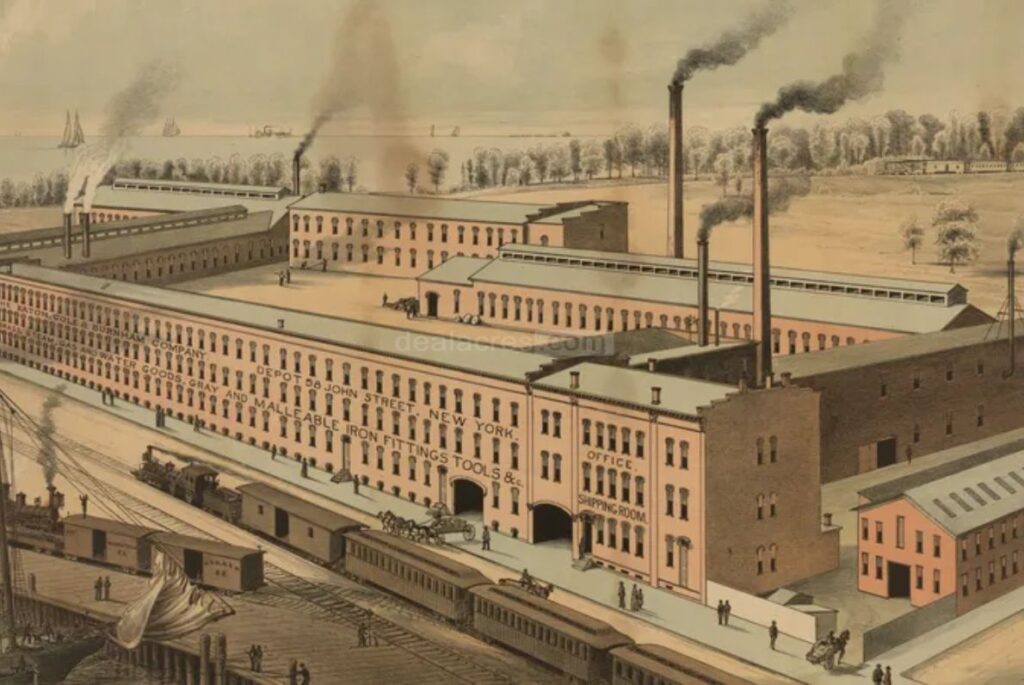Introduction: Navigating the Corporate Evolution
The corporate world is like a vast landscape with a history full of twists, turns, and groundbreaking moments. In this journey, certain pivotal points have shaped the terrain we stand on today. Let’s embark on a simple exploration of these milestones, unravelling the stories behind the evolution of the corporate world.

1. The Industrial Revolution: Igniting the Flame of Change
Picture a time when steam engines roared to life and factories emerged from the quiet countryside. The Industrial Revolution marked a pivotal shift, transforming manual labour into mechanized production. It’s like turning the first page of a book, setting the stage for the corporate world’s monumental journey.
Practical Insights: The transition from handcrafted to machine-produced goods revolutionized industries, shaping the modern business landscape.
2. The Birth of Multinational Corporations: Globalizing Commerce
Imagine companies expanding their reach beyond borders, becoming global giants. The birth of multinational corporations (MNCs) was like spreading wings for a wider flight. These corporations went beyond national boundaries, establishing a global network of commerce.
Practical Insights: MNCs not only impacted economies but also laid the foundation for globalized business practices.
3. The Information Age: Riding the Digital Wave
Think of a time when computers became household companions and the internet connected the world. The Information Age brought forth a digital revolution, transforming the way businesses operated. It’s like upgrading from a manual typewriter to a high-speed computer – a leap into a new era.
Practical Insights: The digital transformation increased efficiency, communication, and accessibility, reshaping the corporate landscape.
4. The Dot-Com Boom: Riding the Internet Surge
Visualize a period when “dot-com” became a buzzword and internet-based companies flourished. The Dot-Com Boom was like a meteor shower of startups, shining brightly and sometimes fading away. It revolutionized how businesses perceived and utilized the internet.
Practical Insights: The Dot-Com Boom introduced e-commerce, online services, and a new wave of entrepreneurship.
5. Corporate Social Responsibility (CSR): A Shift towards Purpose
Picture corporations realizing the importance of more than just profits – a commitment to social and environmental responsibility. The rise of Corporate Social Responsibility (CSR) was like a beacon guiding businesses toward a more ethical path. Companies began considering their impact on communities and the planet.
Practical Insights: CSR not only enhanced corporate reputations but also emphasized the role of businesses in contributing to societal well-being.

6. The Rise of Silicon Valley: A Hub of Innovation
Imagine a region where garages birthed tech giants and innovation echoed through the air. The rise of Silicon Valley was like witnessing a phoenix emerge from the ashes of old industries. This hub became synonymous with technological innovation, startup culture, and the pursuit of the next big idea.
Practical Insights: Silicon Valley’s influence extended beyond technology, shaping the culture of entrepreneurship and innovation worldwide.
7. The Great Recession: Navigating Economic Challenges
Visualize a time when financial markets trembled and businesses faced unprecedented challenges. The Great Recession was like a storm that tested the resilience of corporations globally. Companies adapted, implemented cost-cutting measures, and reevaluated business models to survive the economic downturn.
Practical Insights: The Great Recession highlighted the need for financial prudence and adaptive strategies in the corporate world.

8. Remote Work Revolution: Redefining the Workplace
Think of a shift where office cubicles transformed into virtual spaces, and Zoom meetings became the norm. The Remote Work Revolution was like a seismic change, altering the traditional concept of the workplace. This shift not only increased flexibility but also presented new challenges and opportunities.
Practical Insights: The acceptance of remote work showcased the adaptability of businesses and the integration of technology in daily operations.
Conclusion: The Tapestry of Corporate Evolution
Tracing the pivotal points that have influenced today’s corporate world is like unravelling the intricate threads of a tapestry. The Industrial Revolution ignited the flame, multinational corporations globalized commerce, the Information Age brought digital transformation, and the Dot-Com Boom rode the internet surge. Corporate Social Responsibility introduced a shift towards purpose, Silicon Valley became a hub of innovation, the Great Recession tested resilience, and the Remote Work Revolution redefined the workplace.
Each milestone in this journey has contributed to the complex, ever-evolving landscape of the corporate world. It’s like a puzzle where each piece represents a moment that shaped the way businesses operate today. By understanding these pivotal points, we gain insights into the forces that have propelled the corporate world forward and continue to influence its trajectory. So, as we navigate this landscape, let’s appreciate the lessons from the past and anticipate the exciting chapters yet to unfold in the ongoing evolution of the corporate world.




